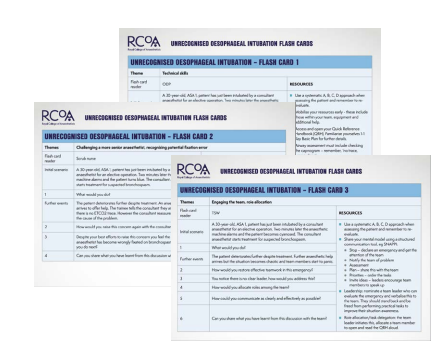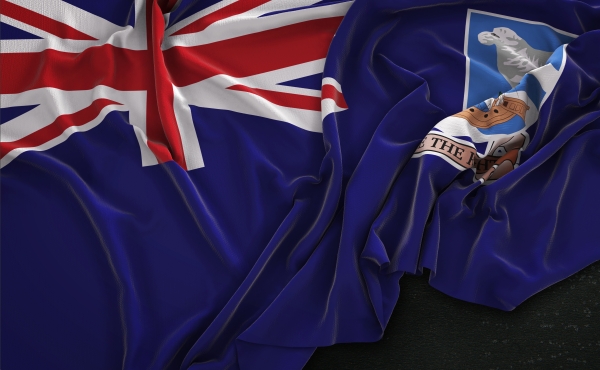Flashcard simulation helps tackle unrecognised oesophageal intubation

Sheffield Teaching Hospitals NHS Foundation Trust

Portsmouth Hospitals University NHS Trust
Following the avoidable death of Glenda Logsdail, from failure to identify and appropriately manage a misplaced tracheal tube, the RCoA, Association of Anaesthetists, and Difficult Airway Society launched a patient-safety campaign in November 2021.1 This campaign aims to disseminate and embed in practice the lessons learnt to prevent future deaths from unrecognised oesophageal intubation.2
The coroner’s report highlights the critical importance of anaesthetic non-technical skills to safe anaesthetic practice.3 Previous coroners’ reports submitted to the RCoA in the last five years show this devastating complication to be a recurring theme, and they similarly emphasise failures in non-technical skills as a key cause.
The RCoA strongly supports the view that regular multidisciplinary training of teams that work together has an important role to play in safe practice, not just allowing rehearsal of emergency drills and testing of systems, but embedding non-technical skills in practice and enabling teams to function well within a flattened hierarchy.4&5 However, in practice, these standards are ones that many departments find difficult to meet to an adequate level due to the pressure on time.
On the basis of the coroners’ concerns regarding inadequate non-technical skills of teams, a key component of this campaign seeks to promote learning from these cases of unrecognised oesophageal intubation, and to do this through theatre team training by developing resources to support departments. Integral to this has been the implementation of flash cards6 to provide teams with short talk-through scenarios that can be easily run through during a busy day in theatre. Following their distribution to all anaesthetic departments in November 2021, we are now taking stock of their impact so far.
First some background on the flash cards. This initiative was first piloted by Dr Tom Burr (then Simulation Fellow) and Dr Barry Featherstone (consultant anaesthetist) at East Kent Hospitals NHS Foundation Trust in 2019 as part of a trust-wide theatre team training project. We adapted this concept to develop a resource for this campaign to address central themes highlighted in the coroner’s reports. These involve the technical and non-technical
skills needed to avoid unrecognised oesophageal intubation and are summarised by our goals:
- to improve the recognition of oesophageal intubation as quickly as possible under high- pressure conditions and reinforce understanding of the significance of absent capnograph waveform
- to improve multiprofessional team working in this emergency scenario by rehearsal of the necessary actions
- to empower team members to speak up and challenge when required.
The flash-card pack contains three high- pressure scenarios designed to take only five minutes for the theatre team to talk through at the team briefing. Flash card 1 focuses on technical skills, re-emphasising the importance of recognising the absent capnograph waveform as promoted by ‘NO TRACE = WRONG PLACE’. 7 Flash cards 2 and 3 explore the non-technical skills aspect of human factors, particularly recognising potential fixation error, engaging the team, role allocation, and challenging a senior. In November, the flash cards were distributed to all anaesthetic department clinical directors in the UK, and a digital copy was published on the RCoA website. They were further publicised in The Gas newsletter, January’s Bulletin,2 and on the College YouTube page.

To gauge engagement and success of the campaign, we asked all anaesthetic departments to tell us what they had done to embed the lessons of this case and for structured feedback on the use and impact of the resources we have provided, including the flash cards.
A total of 90 departments from across the UK returned survey responses. The results show a prominent role of the flash cards in promoting awareness of unrecognised oesophageal intubation (UOI). They were the most popular (53%) multidisciplinary team-training method used to spread key messages of the campaign. Other methods included Airway Days/Workshops (21%), Tea Trolley Training (14%) and Audit Days/ Meetings (12%). Multidisciplinary team training overall formed 30% of the methods of promoting the campaign's messages, alongside discussion at clinical governance meetings and email circulation.
The survey also supports their efficacy as a team-training tool more generally, with 72% of respondents thinking flash cards provide a beneficial team-training tool.
The survey provides useful guidance for improvement of the flash cards. Comments generally fall into two categories: usability of the flash cards and expanding their use. Examples from the first category include further simplification of the questions, changing the scenario from a known to unknown diagnosis, and removing an allocated team member to read out the flash card. Regarding the second category, feedback included wanting flash cards on other critical incidents and expanding the UOI scenario to other settings: paediatrics, critical care and obstetrics.
Overall, the flash cards show great promise, both as a means of promoting this important patient-safety campaign, and by providing a tool for other more general multiprofessional team training to be used alongside other team training resources. In the coming months we plan to develop the flash cards in the light of this initial phase of implementation, improving their usability as a resource for the mutidisciplinary team and developing further UOI scenarios for use in other settings.
In the meantime, we are all well placed to promote and implement these flash cards in our workplaces as part of our collective action in response to this campaign. Please do contact us with any further comments or feedback.
Click to access a digital copy. Please do contact us with any further comments or feedback.
References
- RCoA Preventing Future Deaths webpage
- We are all human but together we can prevent unrecognised oesophageal intubation, Dr Russel Perkins article, RCoA Bulletin Jan 2022
- Glenda Logsdail: Prevention of future deaths report, Milton Keynes Coroner’s Court, September 2021
- Guidelines for the provision of anaesthesia services 2022
- ACSA Standards 2022 (Standard 2.5.6.2)
- Unrecognised oesophageal intubation flashcards
- NO-TRACE WRONG PLACE
View flashcards
More from the Digital Bulletin
- Bulletin: October 2022
- Editorial
Burnout: will the snowflakes gather?
- Bulletin: October 2022
- Editorial
As we were: my Pask certificate of honour
- Bulletin: October 2022
- Editorial
Assisted dying and the RCoA
Are you enjoying the Digital Bulletin?
It's now very easy to opt-out of the print version and only receive the digital Bulletin. Log in/sign up for My RCoA untick the print option and tick the digital option.






